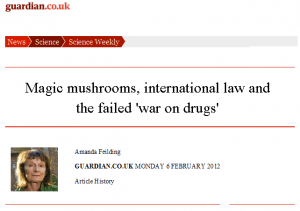
Magic mushrooms, international law and the failed ‘war on drugs’, Amanda Feilding

Recent research suggesting potential therapeutic benefits of psilocybin focuses attention on the need to reform drug laws

Research initiated by the Beckley Foundation hints at antidepressant properties of psilocybin, the active ingredient of magic mushrooms. Photograph: Peter Dejong/AP
It’s been a busy fortnight. First the publication of two major peer-reviewed research papers about magic mushrooms that attracted worldwide publicity. Then off to Prague for an international drugs policy symposium. And just last week, news of a large grant for our next collaborative study with Imperial College. But I’m getting ahead of myself.
I established the Beckley Foundation some 14 years ago as a think tank on drugs policy. It was apparent even then that the “war on drugs” had failed. A 1997 report by the United Nations Drugs Control Programme put the value of the global trade in illicit drugs at around $400bn. Recent UN figures show that global production of opium (used mostly to make heroin) rose by almost 80% between 1998 and 2009. The market in illicit drugs is the third largest market in the world, after food and oil.
The health statistics are equally grim. In some countries – including some within the EU – more than three-quarters of intravenous drug users are infected with hepatitis C. Worldwide, there are several million non-fatal drug overdoses each year. Drug wars themselves also claim a dreadful toll: more than 47,000 deaths in the past five years for Mexico alone, according to the latest estimates.
However, while it is clear that existing policies are crying out for reform, what is less clear is how to foster the required political will.
The Beckley Foundation is the only organisation to combine rigorous scientific research with detailed policy analysis in an attempt to address that question. Our premise is simple: drugs policies should focus on health, harm reduction and cost-effectiveness, and should be based on the best available scientific evidence. That means trying out and evaluating a variety of policy ideas, as well as researching the physical effects of drugs.
Drugs policies around the world are based on three UN conventions, dating from 1961, 1971 and 1988. The conventions allow limited production and possession of drugs, but only for scientific and therapeutic use. In particular, parties to the 1988 Convention (which include the vast majority of UN member states) are obliged to criminalise the production, distribution, sale, purchase and possession of listed drugs other than for approved scientific and medical purposes. The result is the criminalisation of millions of people guilty of nothing other than personal drug use.
It is important to realise that an illegal market is a completely unregulated market. The evidence indicates that decriminalising personal possession and use saves valuable police time and criminal justice resources, and does not increase the prevalence of drug use. Moreover, because users are no longer regarded as criminals, their access to education and treatment is improved and the harm caused by problem drug use is reduced. That is why, together with the All-Party Parliamentary Group for Drug Policy Reform, we organised a meeting of government leaders, policy makers and experts at the House of Lords in November at which we launched a Global Initiative for Drug Policy Reform.
At that meeting, we presented a report commissioned by the Beckley Foundation into how the UN conventions could be amended to allow countries more freedom to create national policies based on their individual needs. We heard fascinating evidence from the Czech Republic, Portugal and elsewhere about their experiences of moving – within the “wiggle room” permitted by the UN conventions – towards policies based on public health, education and harm reduction rather than criminal enforcement.
At the symposium in Prague last week, a group of international experts again discussed possible reform mechanisms: partial decriminalisation under the existing conventions, and explicit decriminalisation or strict government regulation under amended conventions. We also considered problems caused by the current legal regime, such as the difficulty Bolivia faces in trying to get an exemption to permit the millennia-old indigenous tradition of chewing coca leaves.
The Beckley Foundation’s focus on health-oriented policies demands a research programme to gather relevant evidence. That evidence also affords profound insights into how the brain works and potential therapeutic uses of psychoactive drugs.
Which brings me back to those recent scientific papers, products of a collaboration between the Beckley Foundation and Professor David Nutt’s department at Imperial College London. Using the latest functional magnetic resonance imaging (fMRI) techniques, the team looked at the brains of subjects as they received an intravenous dose of psilocybin, a psychedelic drug found in magic mushrooms. The papers were published in the Proceedings of the National Academy of Sciences and the British Journal of Psychiatry.
Many users of psychedelics report the experience as a consciousness-expanding one, and conventional wisdom suggests that such drugs should increase brain activity and blood flow to the brain.
Instead, the research in PNAS showed that psilocybin decreased blood flow to specific regions of the brain that act as “connector hubs”, where information converges and from where it is disseminated. In the paper, we suggest that these hubs normally facilitate efficient communication between brain regions by filtering out the majority of input in order to avoid over-stimulation and confusion. But the hubs also constrain brain activity by forcing traffic to use a limited number of well-worn routes. Psilocybin appears to lift some of these constraints, allowing a freer and more fluid state of consciousness.
In the second study, subjects were given cues to recall positive events in their lives. With psilocybin, their memories were extremely vivid, almost as if they were reliving the events rather than just imagining them.
The findings suggest potential uses for psilocybin in the treatment of depression, a condition characterised by rigidly pessimistic thinking patterns. These fixated patterns are associated with overactivity in the medial prefrontal cortex – one of the same connector hubs deactivated by psilocybin. Psilocybin may also be a useful adjunct to psychotherapy, helping patients who are stuck in negative thought patterns to access distant memories and work through them.
The newly published results are exciting enough to have generated funding for a major study into psilocybin and depression, which will begin shortly. Watch this space.
Amanda Feilding is director of the Beckley Foundation, a think tank working for health-oriented drug policies based on scientific research
Podcast
- All
Links
- All
Support
- All
BIPRP
- All
Science Talk
- All
Amanda's Talks
- All
- Video Talk
- Featured
- 2016 Onwards
- 2011-2015
- 2010 and Earlier
- Science Talk
- Policy Talk
One-pager
- All
Music
- All
Amanda Feilding
- All
Events
- All
Highlights
- All
Psilocybin for Depression
- All
Current
- All
Category
- All
- Science
- Policy
- Culture
Substance/Method
- All
- Opiates
- Novel Psychoactive Substances
- Meditation
- Trepanation
- LSD
- Psilocybin
- Cannabis/cannabinoids
- Ayahuasca/DMT
- Coca/Cocaine
- MDMA
Collaboration
- All
- Beckley/Brazil Research Programme
- Beckley/Maastricht Research Programme
- Exeter University
- ICEERS
- Beckley/Sant Pau Research Programme
- University College London
- New York University
- Cardiff University
- Madrid Computense University
- Ethnobotanicals Research Programme
- Freiburg University
- Medical Office for Psychiatry and Psychotherapy, Solothurn
- Beckley/Sechenov Institute Research programme
- Hannover Medical School
- Beckley/Imperial Research Programme
- King's College London
- Johns Hopkins University
Clinical Application
- All
- Depression
- Addictions
- Anxiety
- Psychosis
- PTSD
- Cancer
- Cluster Headaches
Policy Focus
- All
- Policy Reports
- Advisory Work
- Seminar Series
- Advocacy/Campaigns
Type of publication
- All
- Original research
- Report
- Review
- Opinion/Correspondence
- Book
- Book chapter
- Conference abstract
- Petition/campaign
Search type